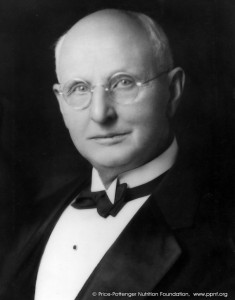Dr. Weston Price – Widespread Disease Is A Modern Phenomenon
We know from studying isolated traditional societies, people who are relatively untouched by civilization, that what is good for younger people is generally good for older people. There are some important exceptions that I will get to later.
The first modern researcher to take a detailed look at the eating habits of non-industrialized people was a dentist, Dr. Weston Price. In the 1930’s Dr. Price traveled all over the world and found 14 groups of people from Africa to the Eskimos to remote parts of Europe, and found that almost every member of the tribe or village enjoyed excellent health. They were free of chronic disease, mental illness and tooth decay. They were strong and produced healthy children easily, and remained physically active and agile into old age.
Here is what he found when he looked at their diets: local, entirely natural foods. Of course, the foods were all organic, because that simply means lack of synthetic pesticides. Far from being a gourmet luxury item, the entire human diet was always organic until experts decided for us that we could tolerate strong neurotoxic pesticides on all the food we ingested. And so we started eating non-organic food, a first in human history.
But getting back to the remote isolated villages that Dr. Price found – Almost every group ate plenty of seafood or other animal proteins and fats in the form of organ meats and dairy products. They valued animal fat as absolutely necessary to good health. They ate fats and meats, as well as fruits, vegetables, legumes, nuts, seeds and whole grains. Of all the primitive diets that Dr. Price studied, all contained some raw foods, both animal and vegetable.
These are the foods on which these isolated people from remote regions of Ireland to Switzerland to Africa were able to thrive, to endure the harsh winters and hot summers without indoor heating or air conditioning, to produce generation after generation of healthy babies and children who could do the same.
Dr. Price compared them with “civilized people” that is people who had learned to rely more on the foods of the industrial revolution – refined and processed foods, pasteurized milk and sugar. When he looked at the civilized people he found rampant tooth decay – remember Dr. Price was a dentist – as well as rampant infectious diseases, infertility and chronic degenerative diseases of various kinds.
Even those children from the primitive societies who had now adopted the industrialized diet – these children had crooked teeth, deformed bone structure and a tendency to have every sort of medical problem.
Dr. Price then concluded that it was the so-called civilized diet, the one with refined carbohydrates such as flour and sugar, as well as industrially processed fats and oils were to blame for the quick decline in health, just from one generation to the next.
In the years since the 1930’s many studies have unanimously confirmed what Dr. Price found, and I will boil it down to the essence.
Those who eat whole vegetables, fruits, meats, dairy, eggs and grains, live long active lives without physical problems or diseases.
On the other hand, those who eat processed foods – that’s the kind you buy in a package with dozens of ingredients, half of them synthetic, the people who eat sugar and other sweeteners, the people who eat bread and other flour products – these are the people who run into health problems, disease, stiffness, a resulting lack of physical activity with further slow physical degeneration. It has been shown again and again.
Major Diseases Were Rare Until A Few Generations Ago
All of our major diseases – cancer, heart disease, and diabetes – were extremely rare until a few generations ago. In fact, the first heart attack in human history was not described in the medical literature until 1912! This was less than a hundred years ago. Now a heart attack is a very obvious event. It’s not that Hippocrates or the other medical greats of the past would have missed something ike that. Yet nobody wrote about the phenomenon of heart attack until the year 1912. Here is why heart attacks started then and just kept increasing and increasing until we have rampant heart disease now. It was about the turn of the century 1900 when refined and processed foods started coming into the diet. Sugar was starting to be distributed throughout Europe and North America from the West Indies, and whereas Americans had about a half cup of sugar per person per year until the year 1900, now your average American gets that much sugar in a day.
Now I am not talking about natural fruits. Please don’t get so confused on this point as many people do. Eating fruit is very different from eating sweetened desserts. With fruit, the fiber slows down the entry of the natural unrefined sugar into your blood stream. In other words, your blood sugar stays moderate, and your insulin stays moderate. With desserts on the other hand – even with fruit juices – your blood sugar surges upward, and then soon afterward your insulin surges also. Now insulin has two main instructions to the body. One is, now it is time to lay down a layer of fat. The other is to cake a plaque along the inside of your arteries. Don’t let anyone confuse you on this point. It is not your cholesterol that cakes up your arteries so much as the insulin that you secrete and carry in your bloodstream.
Various lifestyles have been observed among centenarians. Of people living past 100, some smoke; some do not. Some drink; some do not. But all those living to 100 had low blood sugar and low blood insulin.
Again your best defense against chronic diseases is to use the following ingredients: vegetables, fruits, meats, eggs – all preferably organic, local and / or free range when available. Do the best you can here. We all have to make compromises on some items that never seem to be available in organic form.
And here is how to incorporate them:
- raw salads, of all kinds
- soups
- stews and casseroles with any kind of meat and any kinds of vegetables
- snacks that involve nuts, cheese, whole fruit in any combination or alone
In this respect, the optimal nutrition for seniors is comparable to the optimal nutrition at any age.
* * * * * * * *
Nutrition For Seniors
There are few ways in which optimal nutrition for people over age 65 is different from nutrition for everybody else.
One is that chewing tends not to be as vigorous as in youth, partly because of dental issues that have arisen over the previous decades. This leads to a preference for softer foods that are not so tough and chewy as a young person might tolerate. The teeth are the first food breakdown tools, and when large unchewed pieces are swallowed, it leaves that job for the rest of the GI tract, which is not really equipped to make that first physical breakdown. So chewing is essential, unless the foods eaten are all semi-liquid.
Otherwise, after a while various kinds of GI distress result, problems such as heartburn or reflux, malabsorption and irritable bowel syndrome.
Another of the main differences is what happens in your gut when you digest food. As we age, the pancreas decreases its function somewhat, so that there aren’t so much of the digestive enzymes as in youth.
Enzymes are pretty nifty chemicals that break down your food to smaller digestible pieces, from big unabsorbable molecules to small, easily assimilated molecules. Yet, after age 50, the food still comes down the gut tube now without as much of these marvelous enzymes to help turn it into the kinds of micronutrients, that is the vitamins and minerals that your body can absorb.
There are things you can do to enhance this process. Smaller more frequent meals are less of a challenge for the pancreas. For example, papaya and pineapple are two foods that provide some of the digestive enzymes. The health food stores have more complete enzyme supplements. And then if you see a naturopathic physician, we consider what is happening with your digestion and prescribe enzyme supplements that are considered for you individually.
In fact, at this point, I have to discuss individual differences, because as life continues, the way that one person may begin to have problems or some deterioration is different than what may happen to another individual. In other words, I have never had a headache in my life. Really. But I’ve had tummy aches. You may have a cast-iron stomach, able to eat anything without a problem, but perhaps you get headaches. As we age, these differences tend to persist and sometimes get worse. So that’s why as a naturopathic physician, I schedule a two-hour initial visit. That gives the patient a chance to discuss pretty much everything they feel is important, and for me to get a good idea what’s going on and to formulate a treatment plan.
We would like to thank the the Price-Pottenger Nutrition Foundation for letting us use a photo of Dr. Price, if you get a chance check out their website at http://ppnf.org/
Let us know what you thought about the article in the comments!




Pingback: Choose Your Foods Like Your Life Depends On Them - Nature Works Best